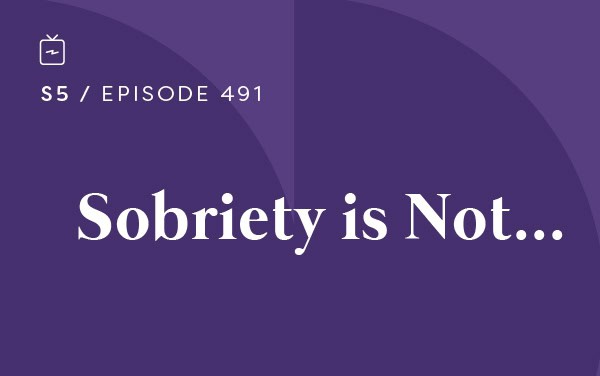
by Kris Oyen | Jul 15, 2024 | Podcast
Podcast: Play in new window | Download
Subscribe to the Recovery Elevator Podcast Apple Podcasts | | More
Episode 491 – Sobriety is Not….
Today we have Santino. He is 36 years old, lives in Taunton, MA, and took his last drink on May 24th, 2022.
Sponsors for this episode:
Visit Better Help today to get 10% off your first month
Café RE – promo code OPPORTUNITY waives set up fee.
[02:55] Thoughts from Paul:
A question we all eventually ask ourselves during our lifetime is – who am I? Eckhart Tolle (the author of The Power of Now and A New Earth) says that through the process of finding out who we are not, we also find out who we are.
One of our Café RE hosts, Tonya, shared a great list of what sobriety is not which Paul shares and elaborates on:
- Sobriety is not the same for everyone.
- Sobriety is not going back to how things were.
- Sobriety does not rid you of your past.
- Sobriety is not the end of your life if you enter recovery or treatment.
- Sobriety is not the end of socializing.
- Sobriety is not something you can do halfheartedly.
- Sobriety is not just a temporary thing.
Rumi says “don’t be held captive. Your life has no border or shoreline”. Don’t be held captive by a mind created definition of what sobriety is because in reality, it can be whatever you want it to be. It can be infinitely boundless.
[10:42] Paul introduces Santino:
This is Santino’s third appearance on the podcast, and he is celebrating 2 years alcohol free at the time of this recording.
Santino grew up in the Midwest but currently lives in eastern MA. He is currently working on writing his memoir and he and his wife are expecting their second child.
Curiosity in his early teens led Santino to try alcohol. He joined the military after high school where drinking is generally part of the culture. Santino considers his drinking rather benign until his late twenties. It was then that he began to use alcohol for coping through uncertainty in his life. Once he started finding himself focusing more and more on his next drink, he began gaslighting and manipulating to protect his drinking. Santino acknowledges that he was becoming like Dr. Jekyll and Mr. Hyde.
Several months before he quit drinking, Santino had a bad withdrawal experience. At the time he was depressed and cared little about himself. He recognized that this may be what a rock bottom feels like and didn’t want to go through this again. He was able to quit for three months in early 2022, but a birthday celebration in March found him falling right into the old habits.
A turning point for Santino was after watching coverage of a school shooting while at the bar. Thinking about becoming a better example for the children of the future, he stopped drinking that day. He calls this clocking out of purgatory. An ultimatum from his wife after discovering hidden debt sealed the deal for Santino.
Comparing the first year of sobriety to the second year, Santino feels there is pure form of clarity that he has. He no longer feels the need to hide anymore. He is exploring who he is and what he can offer to the universe.
Santino says he has been attending individual and marriage therapy which has been helpful to him. He works on fostering his relationships, attends AA meetings, practices positive self-talk, and works on connecting with his emotions and his inner self daily.
Santino’s favorite recovery quote: “the world record for the longest time without a drink is 24 hours.”
One thing Santino has learned in sobriety: that he has always had something to offer the world – his true, authentic self.
Santino’s favorite sober moment: having the emotional capacity to deal with life as he knows it as well as deal with conflicts he would otherwise run away from.
Santino’s parting piece of guidance: give yourself the grace that alcohol will never give you.
Recovery Elevator
Go big, because eventually we all go home.
I love you guys.
RE on Instagram
RE merch
Recovery Elevator YouTube
Sobriety Tracker iTunes
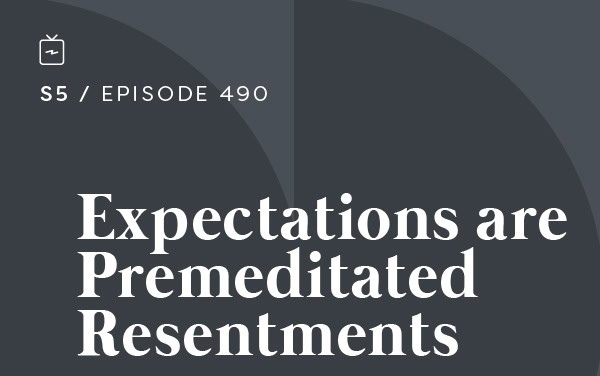
by Kris Oyen | Jul 8, 2024 | Podcast
Podcast: Play in new window | Download
Subscribe to the Recovery Elevator Podcast Apple Podcasts | | More
Episode 490 – Expectations are Premeditated Resentments
Today we have Stephanie. She is 48 years old and lives in San Diego, CA. She took her last drink on January 11th, 2020.
Sponsors for this episode:
Visit Better Help today to get 10% off your first month
Café RE – promo code OPPORTUNITY waives set up fee.
[2:21] Thoughts from Kris:
Kris shares that he and his family have always enjoyed camping. Recently, he was looking forward to a week that the family could get together, probably for the only time this summer due to work and social schedules. Things did not go as planned due to obligations, weather and some mishaps along the way.
Kris found his mind making the determination that if their week didn’t look exactly like it was planned, then it was no longer good. This is one of Kris’s work-in-progress areas in his recovery. He shares that it’s somewhat normal to have expectations from the people in our lives and society in general, but what do we do when people, places and things fall short of those expectations?
A few things that Kris does is practice gratitude – he is grateful for the time he does get to spend with family and the great weather they had for most of the week. He also practices taking a self-inventory and shares page 86 from AA’s Big Book to give us an idea of what that looks like.
Let Kris know how you navigate expectations and resentments – kris@recoveryelevator.com
[09:48] Kris introduces Stephanie:
Stephanie lives in San Diego with her husband and twin 16-year-old boys. She works as a legal analyst for a Fortune 10 company and loves sports. In her free time, she enjoys hiking, playing games and traveling.
Stephanie witnessed her father become a heavy drinker after the loss of her mother. She was young at the time and as she grew up vowed that she would not drink like he did. At 15, Stephanie first tried alcohol and ended up the victim of an assault during a blackout. Due to this, and her father’s alcoholism, Stephanie was very careful with her consumption for many years.
After having kids and one of them was diagnosed with autism, she began to use alcohol as a coping mechanism to deal with her high stress job and parenting. Others would participate with her having drinks after work, so it felt like a normal, adult thing to do.
When Stephanie’s husband became disabled in a work accident, things got tough for them financially. Her drinking increased while she was working to rebuild their lives. As things began to improve for the family, she realized that she was drinking too much but was sure she would be able to quit when she was ready – since she didn’t look like her father, she didn’t think it was that big of an issue.
When she tried to quit alone in 2019, she was able to get four months and thought she could return to normal drinking. After a while she was drinking to blackout again and knew she needed to get help. She attended rehab for 60 days and also discovered the RE podcast. Hearing others share their stories really helped her. Community has become so important to Stephanie, and she has made a lot of friends along the way that she calls her Spiritual Gangsters.
Stephanie’s plan in sobriety moving forward: continue being present with others, exploring her life’s purpose and living life authentically.
Stephanie’s parting piece of guidance: despite what you have been told, life without alcohol is so much more fun, fulfilling and connected than your life while drinking ever was.
We might as well go big RE, because eventually we all go home.
I love you guys.
RE on Instagram
RE merch
Recovery Elevator YouTube
Sobriety Tracker iTunes
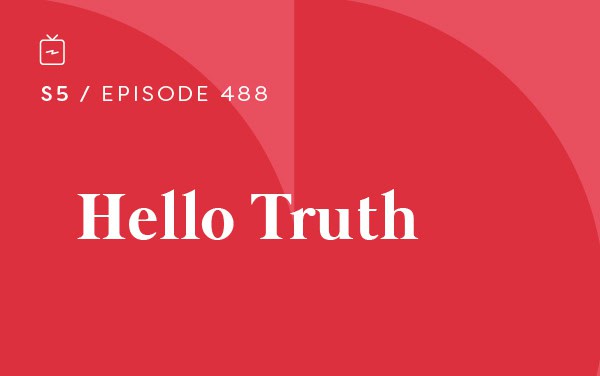
by Kris Oyen | Jun 24, 2024 | Podcast
Podcast: Play in new window | Download
Subscribe to the Recovery Elevator Podcast Apple Podcasts | | More
Episode 488 – Hello Truth
Today we have Christine. She is 58 and lives in Ontario. She took her last drink on December 29th, 2022.
Recovery Elevator is going to Vietnam January 9th-20th, 2025. Registration for our newest alcohol-free travel trip opens July 1st. We have room for 25 passengers on this journey. We have AF workshops, a home stay and a service project planned, plus you’ll be traveling with others who have already ditched the booze.
Better Help: www.betterhelp.com/elevator – 10% off your first month. #sponsored
[02:56] Thoughts from Paul:
Paul shares with us some articles reminding us of what we already know: alcohol is shit.
Society is waking up to the fact that no amount of alcohol is good for you.
In 2023, GQ had an article titled The Year We realize Any Alcohol Is Bad For You.
The World Health Organization, who once supported the stance that one to two drinks per day is beneficial, is now doing an about face. Their headline was No Level of Alcohol Consumption is Safe For Your Health.
The New York times also had an article further showing that the truth is emerging: Even A Little Alcohol Can Harm Your Health.
Canadian Centre on Substance Use and Addiction shares Canada’s Guidance on Alcohol and Heath.
NBC News shares their take on the fact that drinking moderately is not healthier than abstaining
If you want to join the discussion, go to the Recovery Elevator Instagram page and let us know what your thoughts are on today’s intro. Or write to your local politician and let them know that alcohol is shit.
Exact Nature: https://exactnature.com/RE20
[10:08] Kris introduces Christine:
Christine is 58 years old and has two adult children, two cats, and is divorced. Christine is a massage therapist and enjoys participating in theater and reading in her spare time.
Christine said that she knew there was alcoholism in her family, and her parents didn’t drink. She knew it was something that people needed to be careful with.
While at university, she saw her older brother participating in the party scene and believed that drinking was just part of the experience. She started drinking and says that it was like a release valve for her and helped her with her awkwardness.
After marrying her husband, Christine says drinking wasn’t part of their life for a long time. The occasional bottle of wine turned into more alcohol towards the end of the marriage. Upon splitting up and moving to a new community, Christine found a music scene and easy friends there to frequently spend time drinking with.
Christine feels she was leading a double life and not many people knew the extent of her drinking. Her brother noticed and was concerned. Christine started having regret for her drinking and attempted moderation for a while.
Eventually she picked up Allan Carr’s book at the bookstore and began taking notes. Toward the end of 2019 she was able to quit for a period of time until the pandemic struck.
Since she was not working and unable to care for her parents as she had been doing, she used the time to drink and felt entitled to the break. After being able to go out again, she started feeling the shame and despair set in. She began to realize she wasn’t going out for the music and friends, but for the drinks. After getting sick for two weeks and being unable to drink, something told Christine to take this opportunity to keep going.
Christine found podcasts, YouTube testimonials, and began reading quit lit again feeling called to sobriety. She joined and became active in Café RE. Keeping a list in her phone of her whys and why nots which helped her a lot.
Christine’s parting piece of guidance: we shouldn’t be asking ourselves if it’s bad enough to quit, we should be asking if it’s good enough to keep.
Chrstine’s plan in sobriety going forward: seeking in-person connections.
Café RE – promo code OPPORTUNITY waives set up fee.
RE merch
Recovery Elevator YouTube
Sobriety Tracker iTunes
Recovery Elevator
Go big, because eventually we’ll all go home.
I love you guys.
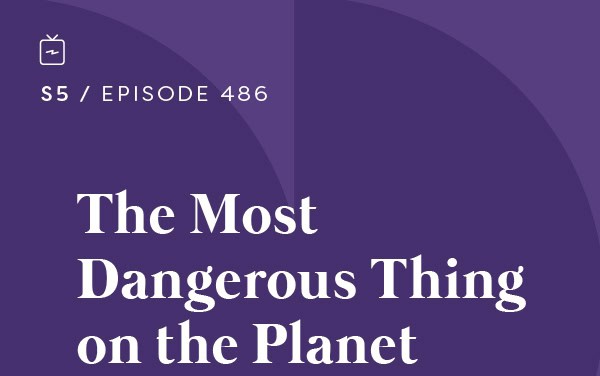
by Kris Oyen | Jun 10, 2024 | Podcast
Podcast: Play in new window | Download
Subscribe to the Recovery Elevator Podcast Apple Podcasts | | More
Episode 486 – The Most Dangerous Thing on the Planet
Today we have Adam. He is 46 from Flowermound, TX and took his last drink on December 31st, 2022.
Recovery Elevator is going to Vietnam January 9th-20th, 2025. Registration for our newest alcohol-free travel trip opens July 1st. We have room for 25 passengers to this southeast Asia destination. We have AF workshops, a home stay and a service project planned, plus you’ll be traveling with others who have already ditched the booze.
Better Help: www.betterhelp.com/elevator – 10% off your first month. #sponsored
[03:00] Thoughts from Paul:
Paul shares many things that are dangerous but concludes that the most dangerous thing on the planet is the Ego. The reason why it is so dangerous is because it is never fully satisfied, it’s always hungry, lives in constant state of lack and is always seeking more, more, more.
Alcohol is but a symptom of the most dangerous thing on the planet. Addiction gets a bad rap, but it does serve a purpose. It forces you to split from the thinking mind. As the author of The Untethered Soul, Michael Singer says you are the one hearing or witnessing the thoughts, but you are not your thoughts.
Some of the humblest people Paul has met have been people in recovery. The addiction is the equalizer and forces us to seek a better way no longer guided by the blind pursuit of the ego.
Sober Link. Sign up for a $50 off promo code.
[10:22] Kris introduces Adam:
Adam is a registered nurse, married to his wife for 23 years and they have two children. He loves hiking, camping and walking and enjoys tabletop gaming and the creativity and childlike innocence that it has awoken.
Alcohol was not very present in Adam’s childhood household. When he was 15, he had a bad experience with hamburgers and cheap alcohol that kept him away for a while. Typical teenage experimentation was there, but not much booze in his high school years.
Becoming a young adult found Adam at college and going to a lot of parties. The heavier partying led to Adam beginning to have blackouts and hangovers. He ended up going to the Appalachian Mountains for some mission work and to get away from his dissonance around substance use. He says it still followed him there and eventually he had to go back home.
Adam says drinking was part of he and his wife’s early dating period. After getting married and having kids, Adam was working 45 minutes from home and found himself drinking on the way home from work and the drinking was becoming daily. He knew it didn’t feel right but continued to do it. Deciding to start nursing school after the birth of their second child was very stressful and Adam’s drinking eventually found him seeking to stop but with short stints of sobriety, he would go back and feel stuck. This continued for Adam for a while and started to affect his relationships.
Adam feels he finally had a time where it just clicked for him. He had joined Café RE and then joined the Restore course and he was able to organize some tools and awareness around his drinking. He knew he had work to do but he was willing to work on it finally. He currently has a great support network and close friends that he is doing the work with. Adam feels that a lot of things about him have changed and every day he sees joy.
Adam’s biggest fear around quitting drinking: the fear of not having fun
Adam’s plan moving forward: staying connected and immersed
Adam’s parting piece of guidance for people thinking about quitting drinking: it makes the world colorful again and life will move in the direction it’s supposed to move.
Café RE – promo code OPPORTUNITY waives set up fee.
RE merch
Instagram
Recovery Elevator YouTube
Sobriety Tracker iTunes
Recovery Elevator
It all starts from the inside out.
I love you guys.
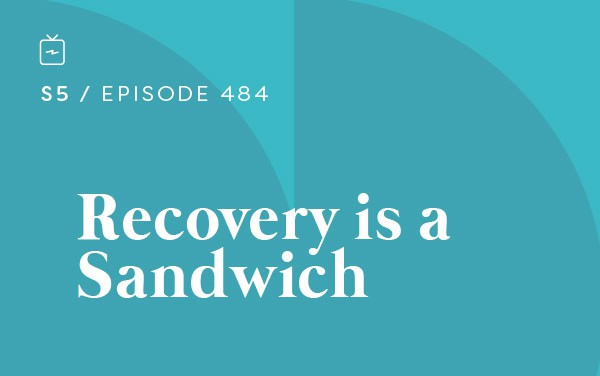
by Kris Oyen | May 27, 2024 | Podcast
Podcast: Play in new window | Download
Subscribe to the Recovery Elevator Podcast Apple Podcasts | | More
Episode 484 – Recovery is a Sandwich
Today we have Brian. He is 59 from Eastern Iowa. He took his last drink on May 23rd, 2023.
Recovery Elevator is going to Vietnam January 9th-20th, 2025. Registration for our newest alcohol-free travel trip opens July 1st and we’ve got room for 25 passengers. Who’s up for seeing the world with a group of travelers who have ditched the booze?
Better Help: www.betterhelp.com/elevator – 10% off your first month. #sponsored
[02:24] Thoughts from Kris:
Kris’ topic today is one of the foundational themes in recovery which is telling our story or burning the ships as we refer to it at Recovery Elevator.
Burning the Ships refers to when Hernan Cortez sailed across the ocean and ordered his men to burn their ships when they landed. There was no turning back, no retreat. When we share our story, we can no longer hide from it and are faced to move forward with others having knowledge of our journey.
This isn’t a black and white situation so it will be different for everyone, and we each have to do what is right for us. Kris shares the different levels of burning the ships and his experiences with them. He feels that the positives outweigh the negatives. When people hear our stories, not just the stats, it changes their perception. Hearing our stories in others’, helps us know we are not alone, and we never know the impact that sharing our stories may have on others.
Think of the moments that have inspired you. What is your version of that? Let Kris know what you think. How has burning the ships played out for you? Email kris@recoveryelevator.com to share your thoughts.
Athletic Greens: https://www.athleticgreens.com/recovery
[10:48] Kris introduces Brian:
Upon the release of this episode, Brian has just celebrated one year of sobriety!
He is married, together they have five adult children and seven grandchildren. Brian is active and enjoys many outdoor activities, home projects, travelling and reading.
Brian grew up on a farm and recalls it was common for people to have drinks after a long day of work. He says he and his friends would sneak beer out of curiosity. When he was in his teens, he and his friends would drive around the gravel roads with a cooler of beer. After graduating high school, Brian joined the military, which was a tradition in his family. He was enlisted for two years and lived the “work hard, play hard” life that is common in that environment.
Shortly after discharge from the Army, Brian got a DUI. He did not feel this was a red flag to stop drinking, just needed to pay the fine and move on. After graduating college, he got his first job in management and married his first wife. They bought land and started a family together. Brian says drinking was mostly social on the weekends and at the local tavern after work.
Brian and his wife got a divorce after 15 years married. Soon after, Brian began suffering from extreme anxiety and panic attacks. He tried medication and meditation to deal with it, but it was still intense.
A few years later, Brian started dating his current wife. They were very social and frequently drank, but she was not a heavy drinker. Brian began to find himself waking up with anxiety and would often change his work hours to accommodate his drinking or recovery from the night before.
In December of 2020 Brian discovered his sister had recently become sober. He feels this really led him to examine his drinking. Upon arriving home from that visit, he started reading a lot and listening to podcasts. He began attending more group chats with Café RE and connecting with other folks in recovery. Brian says his sister taught him a lot of mindfulness exercises which he has found very helpful.
Brian’s parting piece of guidance for those considering sobriety: just dig in and try it.
Café RE – promo code OPPORTUNITY waives set up fee.
RE merch
Instagram
Recovery Elevator YouTube
Sobriety Tracker iTunes
Recovery Elevator
I love you guys.
Go big because eventually we’ll all go home.







